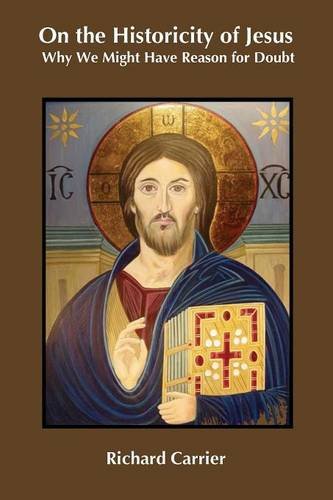
“The purpose of this book is not to end the debate but to demonstrate that scholars need to take this hypothesis more seriously before dismissing it out of hand, and that they need much better arguments against it than they’ve heretofore deployed. A better refutation is needed, and a better theory of historicity, which, actually, credibly explains all the oddities in the evidence. If this book inspires nothing else, I’ll be happy if it’s that. But this book may do more. It might inspire more experts to agree with the possibility at least that Jesus Christ was born in myth, not history.”
This is the only peer-reviewed book tackling the question of whether Jesus existed or not written within the last hundred years. So whether you agree or disagree with Richard Carrier’s conclusion, if you’re at all interested in the question of the historical Jesus, you at least need to read this book to know what all the arguments are.
This book is written with a friendly, conversational tone and is suitable to be read by both the scholar and the layperson alike. Unlike most biblical scholars, Carrier states his assumptions so everything is out in the open. Carrier approaches the question in a very methodical, leave-no-stone-unturned way (the bibliography alone is over 40 pages). I know of no other book about Jesus that takes as many pieces of evidence into account.
Some biblical scholars dismiss Carrier out of hand because he “doesn’t have a degree in a relevant field.” I’d say his degree in ancient history actually makes him more qualified to tackle this question than someone with a degree in theology, but even if he had no degree at all, the evidence should speak for itself. Others dismiss him as an atheist with an ax to grind, however there are Christian scholars (such as Thomas Brodie and Tom Harpur) who also don’t think Jesus was a historical figure, so the Christ myth theory isn’t inherently anti-Christian. Another objection is that the scholarly consensus says Jesus existed, and therefor anyone who goes against the consensus must be wrong. However, most biblical scholars believe that the resurrection actually happened, so they might be a little bit biased.
I’ll do my best to summarize this book, but of course, he goes into much more detail than I will in my summary. He provides copious references and footnotes supporting each of his points that I won’t have time to go into here. So you’d be better off just reading his book for yourself. I’m mainly writing this summary as an aid to memory for myself. Hopefully, I don’t misrepresent his views anywhere.
Chapter 1
There are about as many theories regarding who the historical Jesus was as there are historical Jesus scholars. Historicists (people who believe Jesus existed as a historical figure) disagree with each other over which parts of the gospels are historical and which are mythical. Since these theories contradict each other, almost all of them must be wrong, but all agree that Jesus is at least partly mythical. But what if the figure of Jesus is nothing but myth?
The idea that Jesus didn’t exist isn’t inherently crazy. King Arthur, Moses, Ned Ludd, various cargo cult founders, and many others don’t exist despite many people believing that they did. However, the theory that Jesus didn’t exist has largely been ignored by mainstream biblical scholars due to the poor scholarship of many mythicists (people who believe Jesus didn’t exist as a historical figure). However, historical Jesus studies is almost as full of bad scholarship as mythicism is. They haven’t yet made a solid case proving that Jesus did exist. So we need to methodically comb over all the evidence for and against before coming to a valid conclusion on the question.
Disproving a single mythicist or historicist theory doesn’t disprove them all, so Carrier compares the minimal mythicist theory with the minimal historicist theory to stand in for all of them. Also, the more simple a theory is, the more likely it is to be true. That a man thought to have been named Jesus was responsible for Christianity coming about is more likely than Jesus founded Christianity and was also an apocalyptic prophet. So minimal theories are more likely to be true than more detailed theories.
Since the study of ancient history can only deal with probabilities and not certainties, Carrier employs Bayes’ Theorem to compare the two minimal theories to each other. No theory can be defended in isolation. We must ask whether it is more or less likely than another theory. The first step of Bayes’ Theorem is to determine prior probability for both theories given our background knowledge, then we decide if the evidence we have is expected or not for both theories.
Since Carrier favors the mythicist theory, he will weigh the evidence in favor of the historicist theory throughout in order to prevent his own bias from skewing the results. Since all of us are biased, it’s generally good practice to give preference to the opposing theory and try to prove yourself wrong.